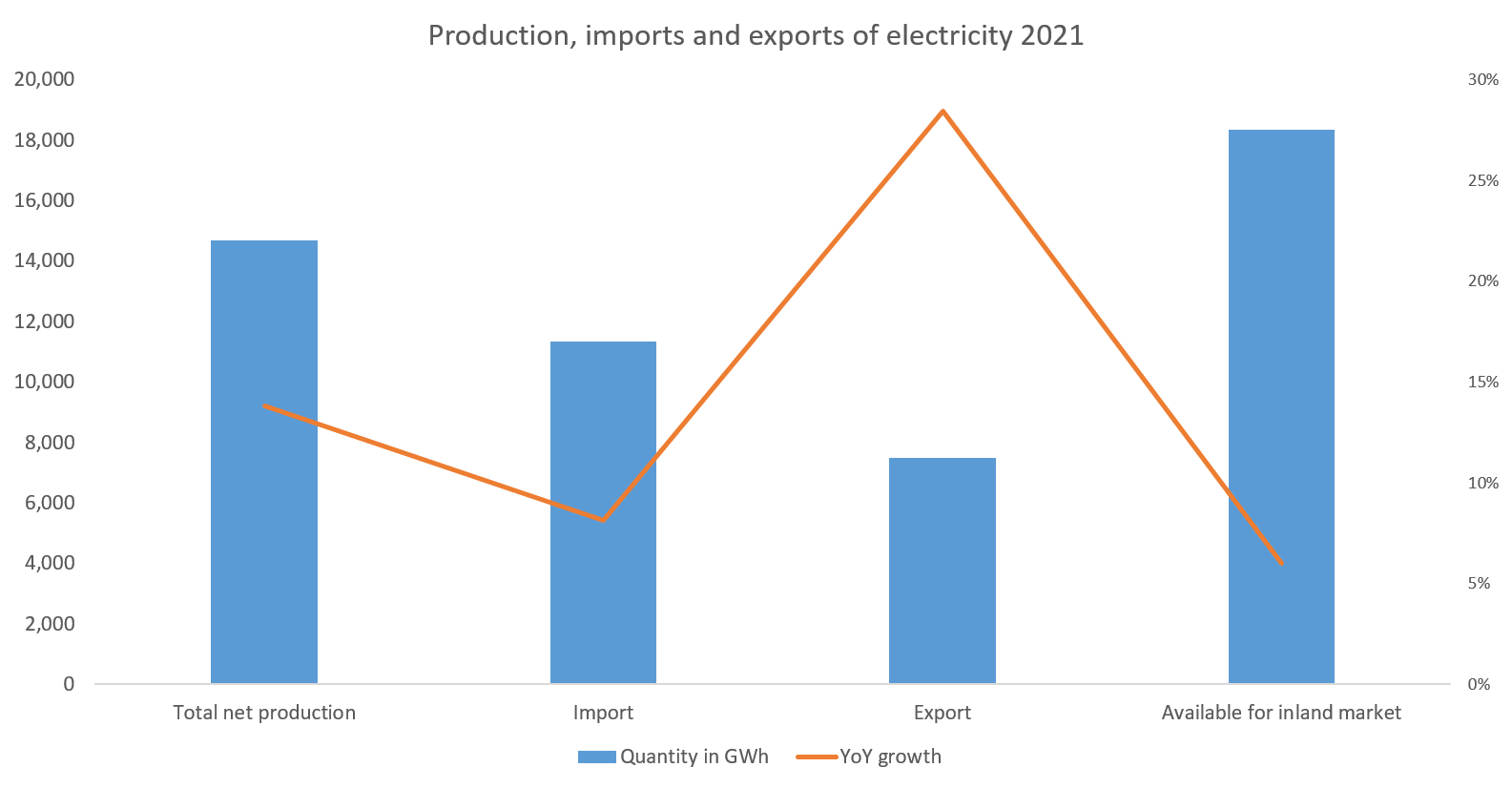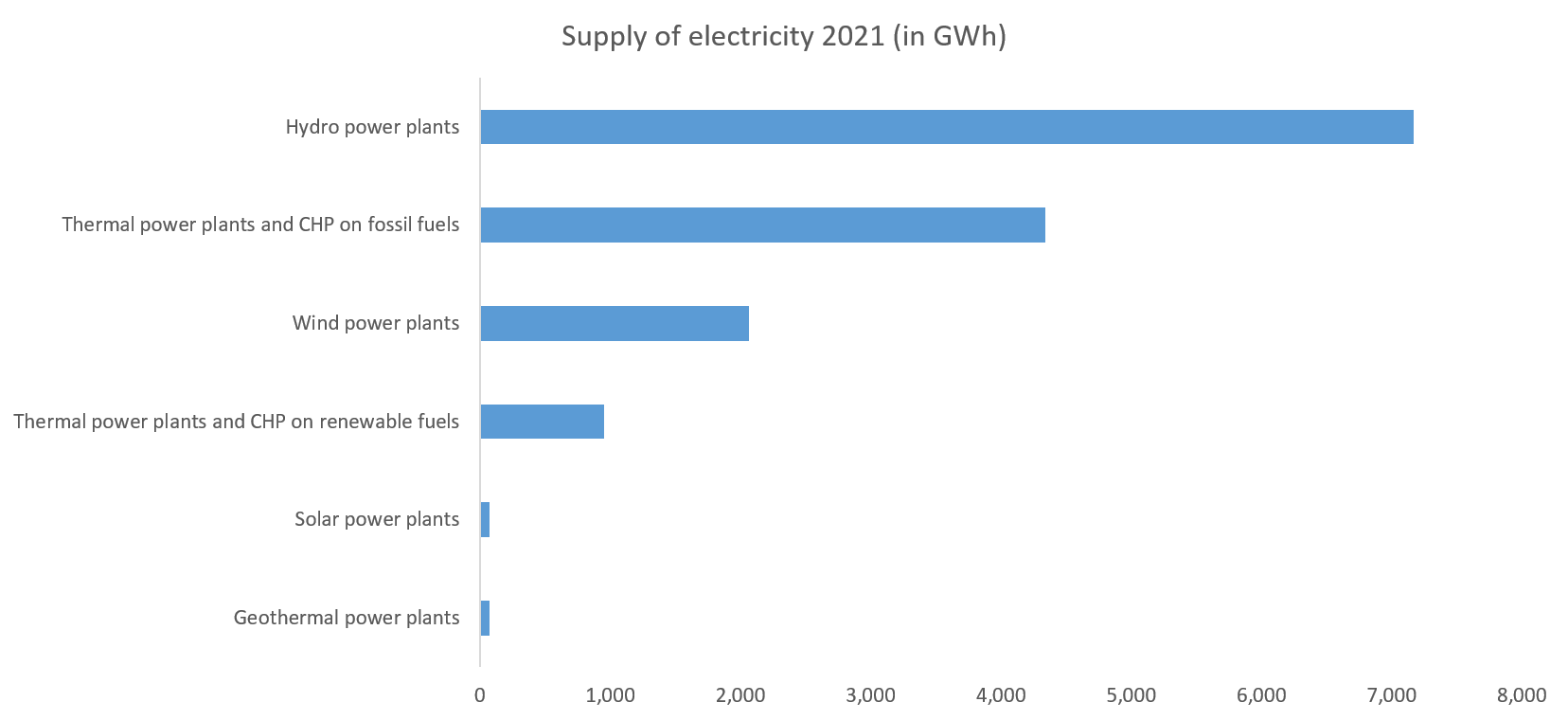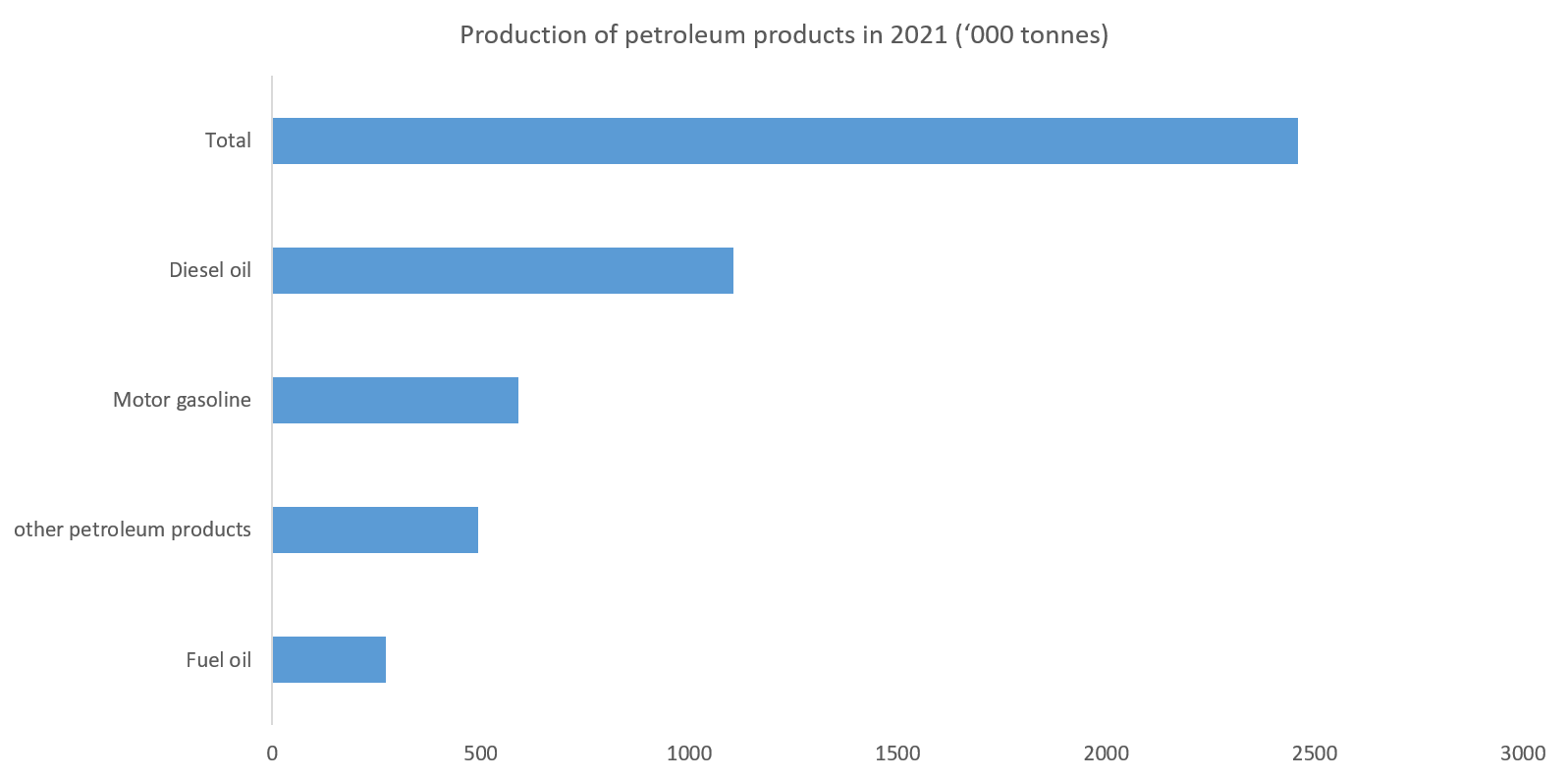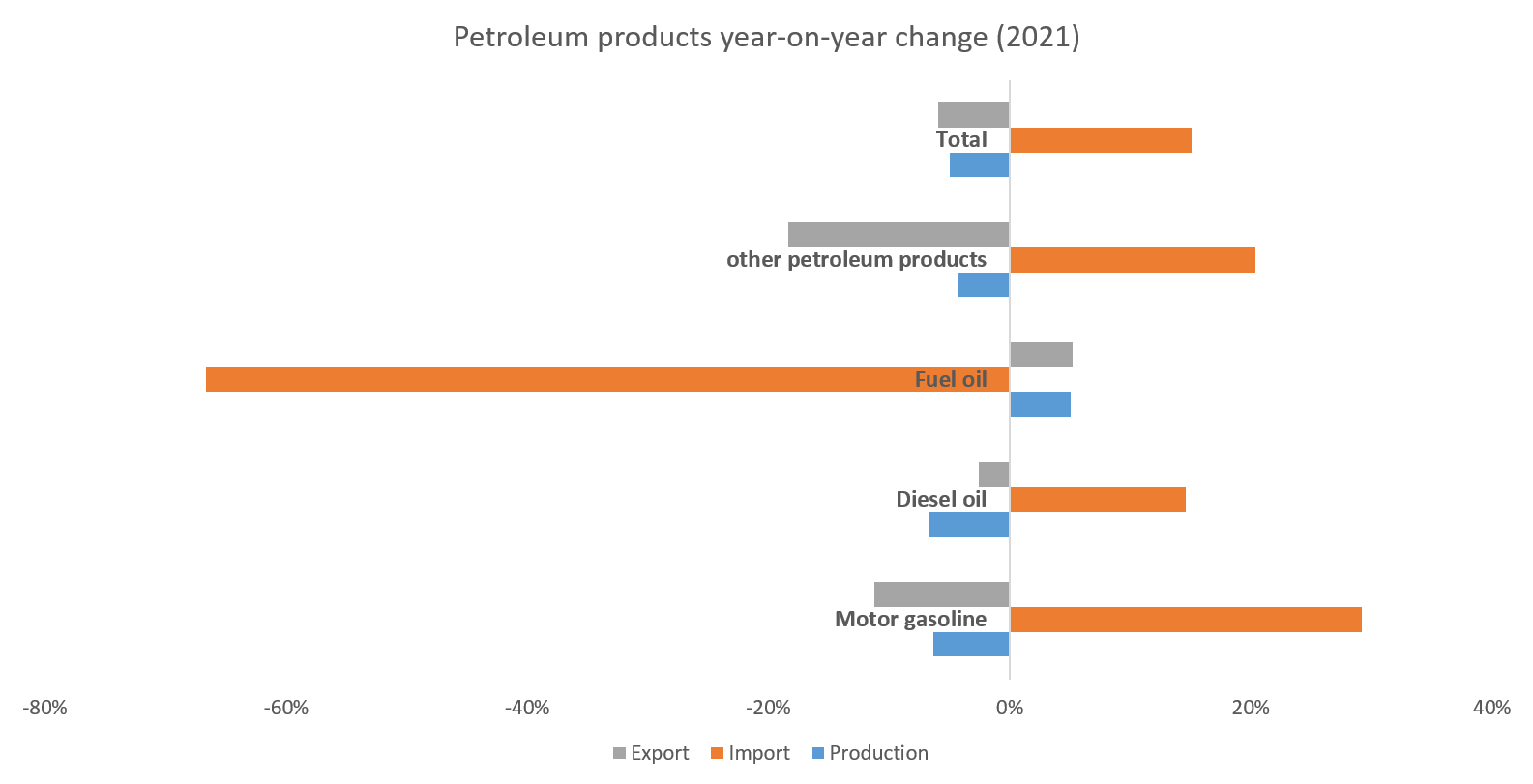Croatian Energy Sector 2021: An Overview
March 7th, 2022 - An overview of the Croatian Energy Sector 2021.
The energy sector is a hot topic these days, and it is not a coincidence since rising prices of electricity, natural gas, and crude oil determine the prices in the overall economy. Energy prices determine the production costs, transportation costs, electricity costs, heating costs among many others. There is a rising concern over the ecological impact of the energy sector as well as the geopolitical impact that has never been more relevant.
Taking into consideration the aforementioned effects, I will shortly go through the energy statistics for 2021 reported by DZS which will give a short description of the Croatian energy sector as it was in 2021.
ELECTRICITY
In 2021, Croatia had total net production of electricity at 14 686 GWh, which is an increase of 14% compared to 2020. Exports and imports amounted to 7505 and 11 342 GWh which leads to 18 359 GWh of electricity available for the inland market. Exports recorded the highest growth with a 28% increase compared to 2020. It should be noted that the imports also include electricity produced by the nuclear power plant Krško in Slovenia of which HEP (Croatian state-owned electricity group) holds 50%.

In 2021, 48.8% of the electricity produced in Croatia came from hydropower, 29.6% from thermal power plants and CHP on fossil fuels, 14% from wind power, and 6.5% from thermal power plants and CHP on renewable fuels. Solar power plants and geothermal power plants accounted for only 1%. Around 70% of Croatia's total net production comes from renewable resources.

NATURAL GAS
In 2021, production of natural gas in Croatia amounted to 780 mln m3, which is a decrease of 12% compared to 2020. Imports amounted to 2240 mln m3 with an increase of 4%, while exports reached 76 mln m3. From natural gas that is available for the inland market, 76.5% comes from imports. Croatia is clearly a natural gas net importer with an export-to-import ratio of 0.03.
CRUDE OIL
In 2021, the production of crude oil in Croatia reached 558 thousand tonnes, a decrease of 4.6% compared to 2020. Imports were at 1767 and exports at 490 thousand tonnes. Both imports and exports were experiencing a year-on-year decrease with 9.2% and 22.5% each, respectively. Refinery input in 2021 was 1849 thousand tonnes which were also lower by 5.8%. Again, as with natural gas, Croatia is a crude oil net importer with an export-to-import ratio of 0.27.
PETROLEUM PRODUCTS
In 2021, 2461 thousand tonnes of petroleum products were produced in Croatia which is a decrease of 4.9% compared to 2020. Gas/Diesel oil had the biggest share with 45%, followed by motor gasoline with 24%.

All observed categories of petroleum products experienced a decrease in the level of production, except for fuel oil which saw an increase of 5%. The same holds for imports and exports, all of the categories except fuel oil saw an increase in imports and decrease in exports compared to 2020.

Looking at the export-import ratio we can see that Croatia is a net exporter in both motor gasoline and fuel oil with ratios of 1.875 and 21.91 in that order. On the other hand, Croatia is a net importer of Gas/Diesel oil and other petroleum products with ratios of 0.49 and 0.59. The category of petroleum products as a whole also has higher imports than exports with a ratio of 0.73.
CRUDE FUELS
Crude fuels are made of hard coal, coke, and brown coal. Croatia does not produce either of these three subcategories of crude fuels. In 2021 Croatia has imported 669 thousand tonnes of hard coal, 29 thousand tonnes of coke, and 4 thousand tonnes of brown coal. Comparing the import data with 2020, we can observe an increase of both hard coal and coke imports by 13.4% and 3.6% respectively. On the contrary brown coal, imports have decreased by 77.8%.
For more, check out our business section.
Slovenian Petrol Not Interested in Croatian Oil and Gas Exploration
November the 9th, 2021 - Croatian oil and gas exploration isn't of particular interest to Petrol from neighbouring Slovenia following the postponement of the conclusion of an exploration contract.
As Poslovni Dnevnik/Marija Brnic writes, before the Slovenian Petrol completed their acquisition of Crodux Derivati Dva (2), the company informed the Croatian Ministry of Economy and Sustainable Development this summer that it was giving up on its exploration mission on two onshore fields, namely S11 and S12, for which it received a concession back in the August of 2019.
According to the official explanation as to why Croatian oil and gas exploration was being put back on the shelf, Crodux first asked for a postponement of the conclusion of the exploration contract and the division of hydrocarbon exploitation, and then reported that they were giving up on the exploration entirely. The exploration period for the above-mentioned fields was set to last five years, and in the event that gas or oil did end up being found, a 25-year period of its subsequent exploitation would have followed.
The Croatian Government's explicit permission for this was a precondition for opening a contract negotiation procedure, followed by the signing of the said contract, but Crodux first cited various difficulties due to the ongoing coronavirus pandemic, and asked for a postponement of the conclusion of the contract, before giving up on it entirely.
The aforementioned ministry received the notification back on June the 7th, and Ivan Cermak withdrew from the position of President of the Management Board of Crodux, which was in the process of taking over from Petrol slightly earlier on, more precisely on June the 1st, meaning that it can be concluded that the new owner of Crodux has no interest in continuing Croatian oil and gas exploration, at least at the moment.
After the withdrawal, a bank guarantee was activated, which pumped a massive 3.75 million kuna into the Croatian state budget.
For more, make sure to check out our dedicated business section.
INA's Revenue Up 2%, Profit Decreases
ZAGREB, October 28, 2019 - INA Group's revenue in the first nine months of 2019 totalled 16.55 billion kuna, two percent more than in the same period of 2018 while the group's profit dropped by 36% to 679 million kuna, shows a financial report the group released on Monday.
CCS EBITDA excluding special items amounted to 2.397 billion kuna, improving 8% compared to the same period last year. The average oil prices decreased somewhat during the first nine months of 2019, therefore the reported EBITDA amounted to 2.208 billion kuna and profit amounted to 679 million kuna, the group said.
The group notes that the first nine months of this year were an intensive investment period.
"CAPEX increased by 69% compared to the same period last year and amounted to 1,541 million kuna, mainly driven by refining investments. Investments in Croatia amounted to 1,319 million kuna, more than double compared to the same period last year. Net gearing amounted to 21% with net debt at 3,036 million kuna," the group said.
Sandor Fasimon, President of the Management Board of INA, said in a comment that the company's intensive investments in the first nine months had started to show results.
"Total investments exceeded 1.5 billion kuna, majority of which was spent domestically. Rijeka refinery turnaround, as one of the largest ones in the company’s history, was completed. Numerous improvements implemented during this turnaround are already visible in the better production structure, with a higher share of profitable white products. This is also to be further improved with future expected projects, in line with the INA Downstream 2023 New Course program.
"Also, the increased level of Upstream activities in Egypt is starting to give results with a 23% increase of oil production in Egypt. This, together with the continuous workover activities in Croatia, currently stabilized the hydrocarbon production impacted with natural decline," Fasimon said.
More INA news can be found in the Business section.
Rijeka Oil Refinery to Install 4 Billion Kuna Worth of Equipment
ZAGREB, September 29, 2019 - An overhaul worth 800 million kuna was carried out in the Rijeka Oil Refinery in Urinj over the first four months of this year, the largest to date, and the installation of a 4 billion kuna delayed coker is being prepared, it was said at the Refinery Open Day on Saturday.
CEO Ivan Krešić said the event was organised to make the company as transparent as possible in its operations and relations with the local community.
The delayed coker, whose installation should be completed in three years' time, will increase profitability and enable the Rijeka refinery to rank with the most high-tech refineries in Europe as well as ensure its long-term viability, he added.
A contract on the installation should be signed by year's end.
More than 2,000 external contractors from dozens of domestic and international companies were hired for the overhaul, said Ivica Jerbić, the refinery's director.
Regular air and sea quality measurements around the refinery show the best results, except in the immediate vicinity, but the overhaul will significantly reduce hazardous particle emissions, he added.
More news about INA oil company can be found in the Business section.
Oil and Gas from Dinarides Would Reduce Energy Dependency
ZAGREB, September 11, 2019 - Minister of Environment and Energy Tomislav Ćorić said on Wednesday that he was satisfied with the interest shown in a tender for oil and gas exploration in the Dinarides and assessed that possible exploitation would reduce Croatia's energy dependency and fill the state and local budgets.
"This is proof that hydrocarbon exploitation in Croatia is continuing and that we have started what we communicated in the beginning - that in addition to creating an infrastructure or alternative supply route, we are increasing production in Croatia," Ćorić told reporters outside Government House with regard to the latest concluded tender for hydrocarbon exploration and exploitation in the Dinarides, which received one bid.
"For Croatia that primarily means that our energy dependency will be decreased. On the one hand, that is what we want, and on the other, in the context of future exploration, that means revenue for the local community as well as for Croatia overall, if in the second phase exploration proves to be commercial," said Ćorić.
He recalled information provided by the Vermillion energy company regarding commercial discoveries at two exploration sites which, according to Ćorić, means a significantly higher income for local communities in the form of an allowance per square kilometre but also for the state because the state, too, will receive its share of extracted hydrocarbon quantities.
The Croatian Hydrocarbon Agency (CHA) on Tuesday announced that it had received one bid in the latest tender to issue licences for exploration and exploitation of hydrocarbons in the area of the Dinarides. Unofficial sources have said that the sole bidder was the INA oil company.
In January this year the government decided to launch procurement procedures for the issuance of licences for exploration and exploitation in the Dinarides, covering an area of 12,134 square kilometres and consisting of four exploration fields in the areas of Karlovac, Lika-Senj, Primorje- Gorski Kotar, Zadar and Split-Dalmatia counties but not including national parks and the areas off the coast and along the border with Bosnia and Herzegovina. The exploration would be conducted for a period of five years.
More news about oil and gas exploration in Croatia can be found in the Business section.
One Bid Received for Gas and Oil Exploration in Dinarides
ZAGREB, September 10, 2019 - The Croatian Hydrocarbon Agency (CHA) has received one bid for a tender to issue licences for the exploration and exploitation of oil and gas in the area called Dinarides, the agency stated on Tuesday.
The call for bids was advertised on February 8 and closed at midday today and a deadline for licence issuance expires this December.
"We are satisfied because a bid has been made and this tender has ended successfully and we should not forget the fact that this is still an unexplored territory. We are also satisfied that all the tenders for onshore areas of Croatia have passed well," the agency told Hina after the bid was opened.
The agency will examine the bid to ensure that it meets all the tender requirements.
In January the government decided to launch procurement procedures for the issuance of licences for exploration and exploitation in the Dinaric Alps in an area of 12,134 square kilometres and for a period of five years. The bid excluded areas of national parks and off the coast and along the border with Bosnia and Herzegovina.
"In the area of the Dinarides, approximately 545.98 km of 2D seismic data has been recorded. Exploration of the area of Dinarides, encouraged by the appearance of petroleum outcrops and bituminous rocks, commenced in the 1950s. Comprehensive and significant geological mapping and geochemical research were performed for the purpose of evaluating hydrocarbon potential of the region," CHA said on its website when the call for bids was advertised.
The exploration in the Dinarides is aimed at reducing the fall in gas and oil production in Croatia, the government said then.
More news about oil and gas exploration in Croatia can be found in the Business section.
Companies to Invest 80 Million Euro at Six Gas and Oil Exploration Sites
ZAGREB, September 3, 2019 - The four companies which were recently chosen by the Croatian government to receive permits for gas and oil exploration and exploitation at six locations in north-western and central parts of the country, are expected to invest about €80 million in the exploration activities in the next five years, the head of the Croatian Hydrocarbon Agency's management board, Marijan Krpan, said on Monday.
The four companies – INA, Crodux Derivati Dva, Vermilion Zagreb Exploration and the Hungarian company called Aspect Croatia – were this past Thursday awarded permits for hydrocarbon exploration and exploitation at the six locations in the interior of Croatia. Thus, the government issued two permits to INA for two locations, and two permits to Crodux, while the other two companies were given one permit each. In late October 2018, the government invited applications for seven sites, and offers have been sent for all but one location.
The companies are expected to drill 25 exploration wells in the next five years.
Energy and Environment Protection Minister Tomislav Ćorić said that Croatia was committed to the exploration and exploitation of gas and oil on its territory.
The exploration activities are due to start in six months' time.
More news about oil industry in Croatia can be found in the Business section.
Green Activists against Awarding New Gas and Oil Exploration Concessions
ZAGREB, July 16, 2019 - Activists of the non-parliamentary party called Green Action on Tuesday held a performance in Zagreb's main square to warn that the government plans to issue licences for gas and oil exploration in new locations.
The activists warned that 75% of Croatia's territory might fall under gas and oil exploration concessions and they branded Environment Protection and Energy Minister Tomislav Ćorić "as a minister of fossil fuels".
They demanded his resignation due to the government's plan to award gas and oil exploration concessions for 16 new sites stretching from eastern Croatia through the Zagreb and Lika-Senj Counties to Dalmatia.
They said that some of the areas covered by concessions are protected areas under the Natura 2000 project.
More news about environmental protection in Croatia can be found in the Lifestyle section.
Vermilion Starts Drilling Exploration Wells in East Croatia
ZAGREB, June 13, 2019 - The Canadian company Vermilion is about to start drilling activities at the Cerić-1 site in the Vukovar-Srijem County and it will soon start preparing a drilling well at the Berak-1 location, and the initial results showing whether there are commercially producible oil and gas reserves can be known in a month's time, according to the information provided by the Croatian Hydrocarbon Agency on Thursday.
The drilling phase ensues after two years of exploration and surveying, and the two drilling wells are part of Vermilion's working programme.
On 6 June, the Croatian government okayed the prolongation of periods for the exploration and exploitation of hydrocarbons on land by INA and Vermilion Zagreb Exploration.
In June 2016, the government signed a contract with INA on one exploration field (Drava 2) and contracts with the Calgary-based Vermilion Exploration company on four exploration fields (Drava 4 and Sava 6, 9 and 10).
The contracts envisage oil and gas exploration and exploitation in four Croatian counties.
Vermilion Exploration was given an exploration permit in June 2015. Since the singing of the relevant contract in June 2016, over 17 million kuna (2.3 million euro) have been paid in fees to local communities, the Agency said today.
More news about oil and gas exploration can be found in the Business section.
Janaf Inaugurates Three New Crude Oil Tanks
ZAGREB, April 2, 2019 - Janaf on Tuesday put into operation three new crude oil tanks in Omišalj on the island of Krk, and this national operator of the oil pipeline and storage system invested nearly 280 million kuna (38 million euro) in this project that enables the storing of 240,000 cubic metres of crude oil on that Adriatic island.
The new tanks increase the capacity of the Omišalj terminal where there are now 20 tanks for the storage of 1.4 million cubic metres of crude oil, while storage capacity for petroleum products is 80,000 cubic metres.
The inauguration of the three tanks completes the process of upgrading the Omišalj facility.
Apart from this terminal, Janaf operates terminals in Sisak, Virje, Slavonski Brod and Zagreb, with the aggregate storage capacity being 1.94 million cubic metres of crude oil and 220,000 cubic metres of petroleum products.
The Zagreb-headquartered company also operates 631 kilometres of oil pipelines throughout Croatia.
Addressing the inauguration ceremony, State Assets Minister Goran Marić said that Janaf, in which the state holds a majority stake, sets the model for other state-owned companies.
Janaf Board chair Dragan Kovačević boasted that the Omišalj terminal was among the top three terminals of this kind in the world.
The company registered a 4.5% rise in both gross and net profits in 2018, with gross profit totalling 370.6 million kuna and net profit 303.7 million kuna.
Total revenue was 781.8 million kuna, which was similar to 2017, whereas total expenditure was cut by 3.5% to 411.2 million kuna.
Last year, Janaf set aside 457.4 million kuna for investment.
More news about Janaf can be found in the Business section.


